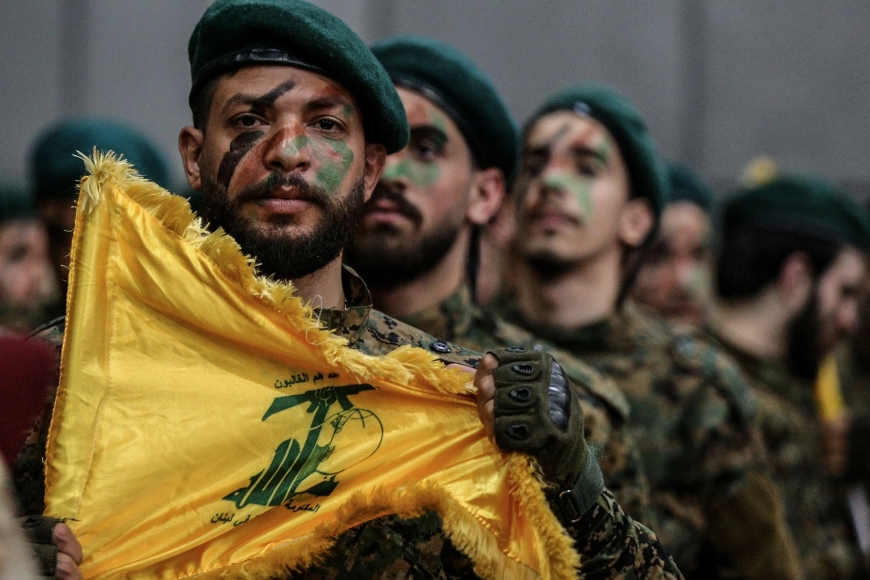Hezbollah Leader Declares ‘New Phase’ in Conflict with Israel Following Assassinations
Hezbollah leader Hassan Nasrallah announced on Thursday that the ongoing conflict with Israel has entered a "new phase" following the recent killings of key militant figures. Speaking to mourners at the funeral of Hezbollah commander Fouad Shukur, who was killed by an Israeli airstrike in Beirut, Nasrallah signaled a shift in the regional dynamics and hinted at forthcoming retaliation.

Hezbollah leader Hassan Nasrallah announced on Thursday that the ongoing conflict with Israel has entered a "new phase" following the recent killings of key militant figures. Speaking to mourners at the funeral of Hezbollah commander Fouad Shukur, who was killed by an Israeli airstrike in Beirut, Nasrallah signaled a shift in the regional dynamics and hinted at forthcoming retaliation.
Meanwhile, in Tehran, Iran's Supreme Leader Ayatollah Ali Khamenei led funeral prayers for Hamas political leader Ismail Haniyeh, who was assassinated in a presumed Israeli operation. The killings of Shukur and Haniyeh have heightened fears of a broader conflict as Iran and Hezbollah weigh their responses.
Escalation Fears Amid Assassinations
The dual assassinations have intensified speculation about potential escalation. Iran has vowed to retaliate for the death of Haniyeh, killed in Tehran on Wednesday. Although Israel has not officially claimed responsibility, Israeli military spokesperson Rear Adm. Daniel Hagari’s comments have neither confirmed nor denied involvement, stating, “There was no additional airstrike, not a missile and not an Israeli drone, in the entire Middle East that night.”
In contrast, Israel did confirm the airstrike that killed Shukur in Beirut, along with an Iranian military advisor and several civilians. This strike followed a rocket attack on the Israeli-held Golan Heights, allegedly orchestrated by Shukur, which killed 12 children. Hezbollah has denied involvement in this attack.
Nasrallah’s Vague but Ominous Warning
Nasrallah, addressing mourners via video link, stated, “We … have entered a new phase that is different from the previous period.” He implied a response was imminent but did not specify details, saying only that Israel “will have to wait for the anger of the region’s honorable people.” He also warned Israel and its chief ally, the United States, to prepare for retaliation.
International Efforts to Prevent Escalation
International officials are actively working to prevent the situation from spiraling into a full-scale war. Since the Gaza conflict began in October, Hezbollah and Israel have exchanged fire almost daily, leading to casualties and mass evacuations. However, these skirmishes have largely stayed within certain limits, thanks to diplomatic interventions.
Earlier this year, Israel and Iran nearly plunged into open conflict after Israel struck Iran's embassy in Damascus in April. This incident triggered a series of retaliatory strikes, which were eventually contained through international diplomatic efforts.
Mourning and Military Operations
In Beirut’s southern suburbs, hundreds of mourners attended Shukur’s funeral, with many carrying Hezbollah flags and photos of the deceased commander. Nasrallah praised Shukur as a veteran leader and reiterated that Hezbollah was not responsible for the Golan Heights attack, accusing Israel of acting without evidence.
Hezbollah announced a return to regular military operations following the mourning period for Shukur. However, Nasrallah clarified that these operations would not be connected to the anticipated retaliation for Shukur’s killing.
Iranian Funeral for Hamas Leader
In Tehran, Ayatollah Khamenei prayed over Haniyeh’s coffin in a ceremony attended by Iran’s new president, Masoud Pezeshkian. The coffin was later transported through Tehran, drawing large crowds. Haniyeh’s remains are scheduled for burial in Qatar on Friday.
Haniyeh had been in Tehran for Pezeshkian’s inauguration and had met with Khamenei before the assassination. Iranian authorities are investigating the attack but have not disclosed details.
Regional and International Reactions
The United States has called for restraint, with Secretary of State Antony Blinken urging all parties to avoid actions that could exacerbate the conflict. Speaking from Ulaanbaatar, Mongolia, Blinken emphasized the need for a ceasefire between Israel and Hamas to break the cycle of violence.
The Middle East stands at a critical juncture as tensions escalate. The international community watches closely, hoping to prevent a devastating war that could engulf the region.













































